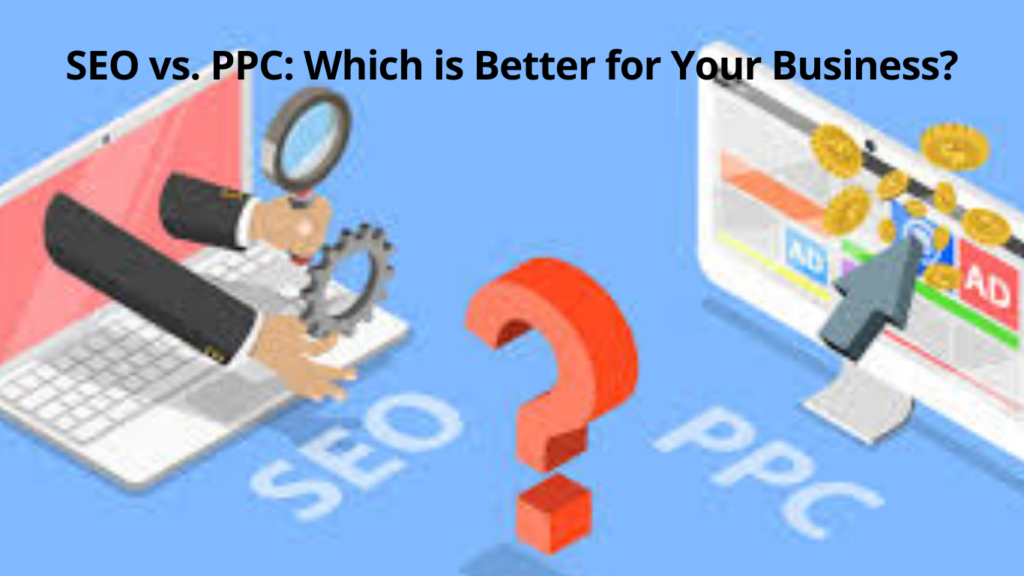Introduction
In the digital age, businesses have numerous options to enhance their online presence and attract customers. Two of the most prominent strategies are Search Engine Optimization (SEO) and Pay-Per-Click (PPC) advertising. Both methods have their strengths and weaknesses, and understanding them is crucial for making an informed decision on which strategy to implement.
What is SEO?
Search Engine Optimization (SEO) is the practice of optimizing your website to rank higher in organic (non-paid) search engine results. SEO involves a combination of on-page techniques, such as keyword optimization, content creation, and meta tags, and off-page strategies like backlink building and social media engagement. The ultimate goal of SEO is to increase your website’s visibility and drive organic traffic from search engines like Google, Bing, and Yahoo.
Benefits of SEO
- Cost-Effective: Once established, SEO can be more cost-effective than PPC, as it does not require continuous payment for ad placement.
- Long-Term Results: SEO efforts can provide long-lasting results, continuing to drive traffic long after the initial work is done.
- Credibility and Trust: Higher organic rankings are often perceived as more trustworthy by users, leading to increased credibility for your business.
- Better Click-Through Rates (CTR): Organic results generally receive higher click-through rates compared to paid ads.
Drawbacks of SEO
- Time-Consuming: SEO can take months to see significant results, making it a slower process compared to PPC.
- Algorithm Changes: Search engines frequently update their algorithms, which can affect your rankings and require ongoing adjustments to your strategy.
- Complexity: SEO involves numerous factors and requires a deep understanding of how search engines work, which can be challenging for beginners.
What is PPC?
These ads appear on search engine results pages (SERPs) and other platforms, such as social media and websites. The most popular PPC platform is Google Ads, but other options include Bing Ads, Facebook Ads, and Instagram Ads.
Benefits of PPC
- Immediate Results: PPC campaigns can drive traffic to your website almost instantly, making it ideal for time-sensitive promotions.
- Scalability: PPC campaigns can be easily scaled up or down based on your budget and needs.
- Measurable Results: PPC platforms provide detailed analytics, allowing you to track performance and ROI accurately.
SEO vs. PPC: Which is Better?
The choice between SEO and PPC ultimately depends on your business goals, budget, and timeline.
- For Immediate Results: If you need quick visibility and traffic, PPC is the way to go. It’s particularly effective for launching new products, time-sensitive promotions, or testing new marketing strategies.
- For Long-Term Growth: If you’re looking to build a sustainable online presence and have the patience to wait for results, SEO is a better option. It’s ideal for businesses aiming to establish credibility and trust with their audience.
- Budget Considerations: If you have a limited budget, investing in SEO can provide better long-term ROI. However, if you have the resources for a significant initial investment, PPC can drive immediate traffic and conversions.
- Industry Competition: In highly competitive industries, both strategies can be beneficial. Combining SEO and PPC can maximize your visibility and ensure a strong online presence.
Conclusion
SEO and PPC each have their unique advantages and are not mutually exclusive. In many cases, a balanced approach that leverages both strategies can provide the best results. By understanding the strengths and weaknesses of each, you can create a comprehensive digital marketing plan that aligns with your business objectives and drives sustainable growth
FAQs
1. What is the main difference between SEO and PPC?
SEO focuses on optimizing your website to rank higher in organic search results, while PPC involves paying for ads to appear at the top of search engine results pages.
2. Which strategy is better for quick results?
PPC is better for quick results, as it can drive traffic to your website almost instantly after launching a campaign.
3. Is SEO more cost-effective than PPC?
SEO can be more cost-effective in the long run, as it does not require continuous payment for ad placement. However, it requires an initial investment of time and resources.
4. Can I use both SEO and PPC for my business?
Yes, many businesses use a combination of both SEO and PPC to maximize their online visibility and achieve both short-term and long-term goals.
5. How long does it take to see results from SEO?
SEO can take several months to show significant results, as it involves improving your website’s organic ranking over time through various optimization techniques.

